Do you find yourself in a predicament where you’re facing eviction and wondering if there’s a way to dispute it on your credit report? Well, you’ve come to the right place! In this article, we’ll explore the possibility of contesting an eviction that appears on your credit report.
While eviction proceedings can be a stressful and challenging experience, understanding your options when it comes to your credit report can help to alleviate some of that worry. So, let’s delve into the details and find out if disputing an eviction on your credit report is feasible!
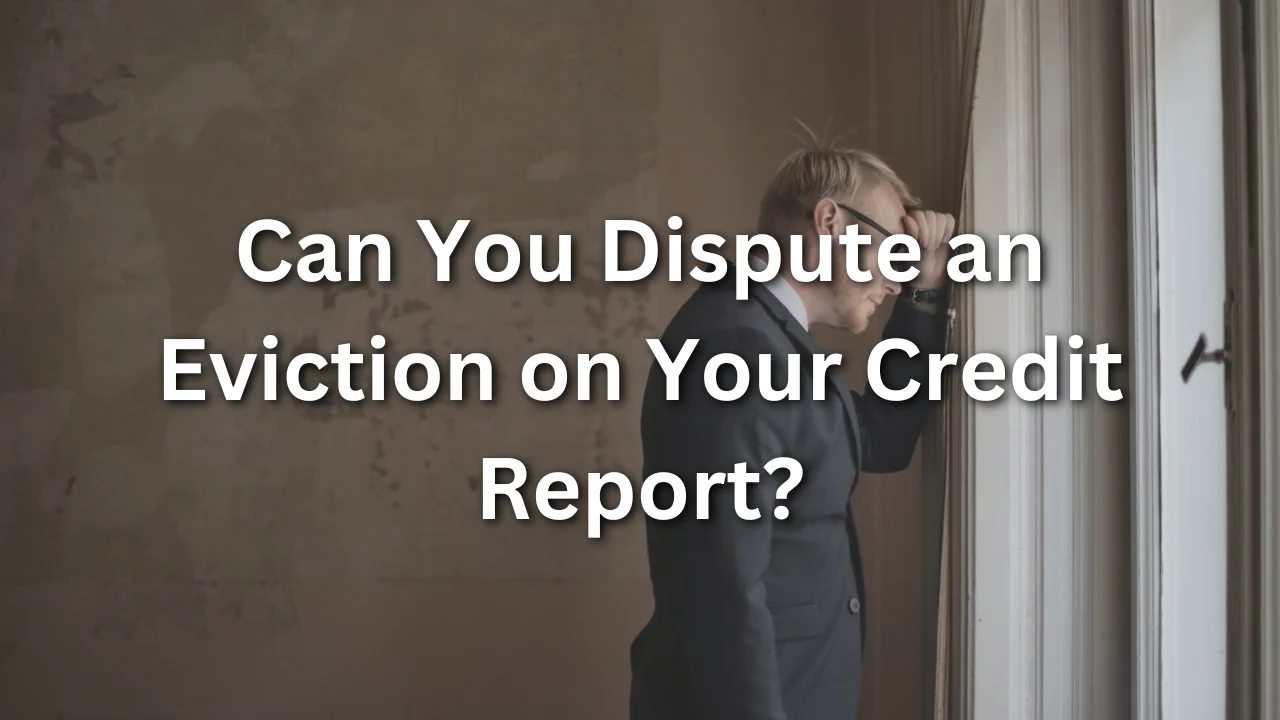
Understanding Evictions on Credit Reports
What is an eviction?
An eviction is a legal process where a landlord removes a tenant from a property due to various reasons, such as non-payment of rent, violation of lease terms, or other breaches of the rental agreement. It is a serious matter that can have long-lasting consequences for tenants, including potentially affecting their credit reports.
How do evictions affect credit reports?
Evictions can have a negative impact on your credit report and can significantly lower your credit score. When an eviction is filed against you, it becomes a public record that can be accessed by credit reporting agencies. This information is included in your credit report, and it may remain there for up to seven years. Potential lenders, landlords, or employers who review your credit report may view an eviction as a red flag, making it more difficult for you to secure loans, find rental properties, or even get hired for certain jobs.
Importance of disputing eviction on credit report
Disputing an eviction on your credit report is essential if you believe it was reported inaccurately or if you are able to resolve the issue with your landlord. Successfully disputing an eviction can have a positive impact on your credit score and overall financial well-being. By taking the necessary steps to dispute an eviction, you can potentially have it removed from your credit report, which will improve your chances of obtaining credit, renting a new home, and moving forward with your financial goals.
Disputing an Eviction on Your Credit Report
1. Gather relevant information
Before diving into the dispute process, it is crucial to gather all relevant information related to the eviction. Obtain a copy of your credit report from all three major credit reporting agencies and collect any eviction-related documents, such as court records, notices, or correspondence with your landlord or property management.
2. Review the accuracy of the eviction
Carefully review the details and dates provided in the eviction report on your credit report. Ensure that the information is correct and accurately reflects the circumstances surrounding the eviction. Look for any potential errors or discrepancies that may strengthen your case during the dispute process.
3. Review your rights as a tenant
Take the time to familiarize yourself with local tenant laws and regulations that govern evictions in your area. Understanding your rights and protections as a tenant will not only help you navigate the dispute process more effectively but also empower you to recognize any potential violations or unfair practices that may have occurred during the eviction proceedings.
4. Contact the credit reporting agencies
Identify the credit reporting agencies that have included the eviction on your credit report. Contact each agency individually to inform them of your intention to dispute the eviction. Be prepared to provide relevant information and documents to support your claim.
5. File a dispute with the credit reporting agencies
Submit a written dispute letter to the credit reporting agencies, clearly outlining the reasons why you believe the eviction is inaccurate or should be removed from your credit report. Include any supporting evidence or documents that strengthen your case. Make sure to keep copies of all communication and follow up regularly to ensure the dispute is progressing.
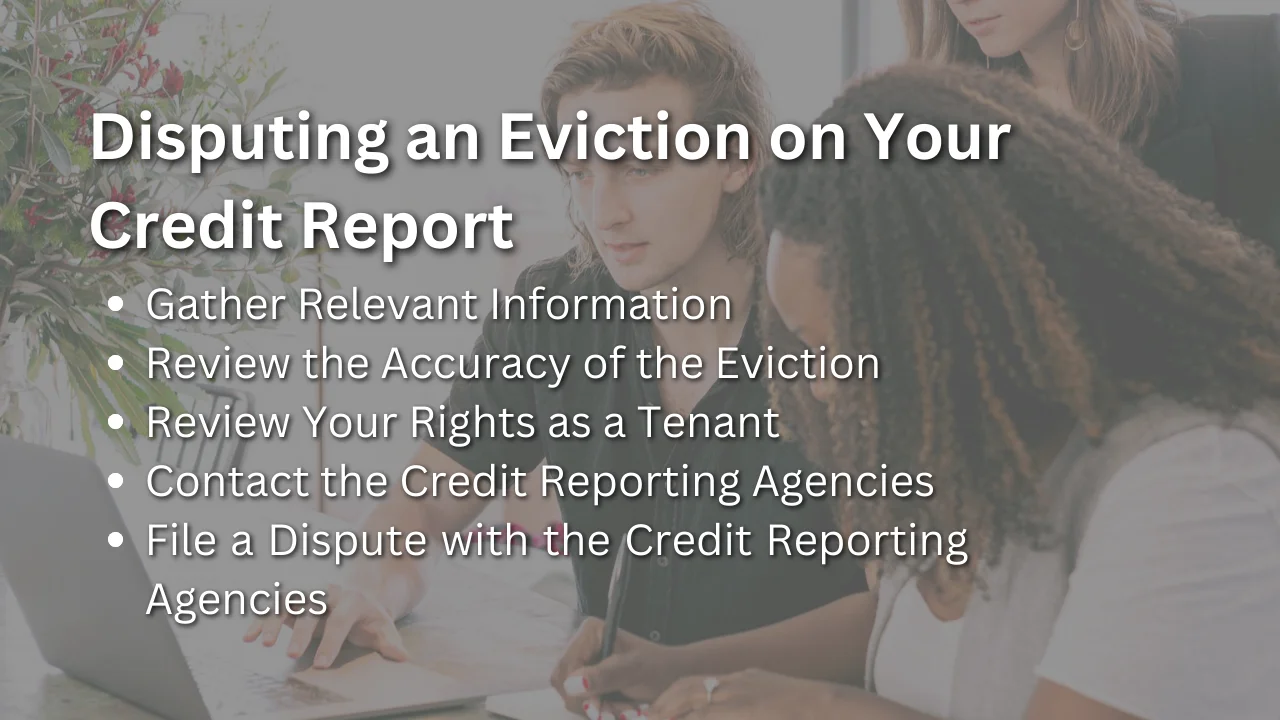
Gathering Relevant Information
1. Obtain a copy of your credit report
To gather all the necessary information related to the eviction, start by obtaining a copy of your credit report from all three major credit reporting agencies: Equifax, Experian, and TransUnion. You are entitled to one free copy of your credit report from each agency per year. Review the reports carefully and make note of any evictions listed.
2. Collect eviction-related documents
Collect all eviction-related documents, such as court records, eviction notices, and any correspondence you have had with your landlord or property management. These documents will serve as evidence when disputing the eviction and will help support your claim that the eviction was reported inaccurately.
3. Review the rental agreement or lease
Thoroughly review your rental agreement or lease to understand your rights and obligations as a tenant. Pay close attention to any clauses or provisions related to evictions. Understanding the terms of your agreement will help you determine if proper legal procedures were followed during the eviction process.
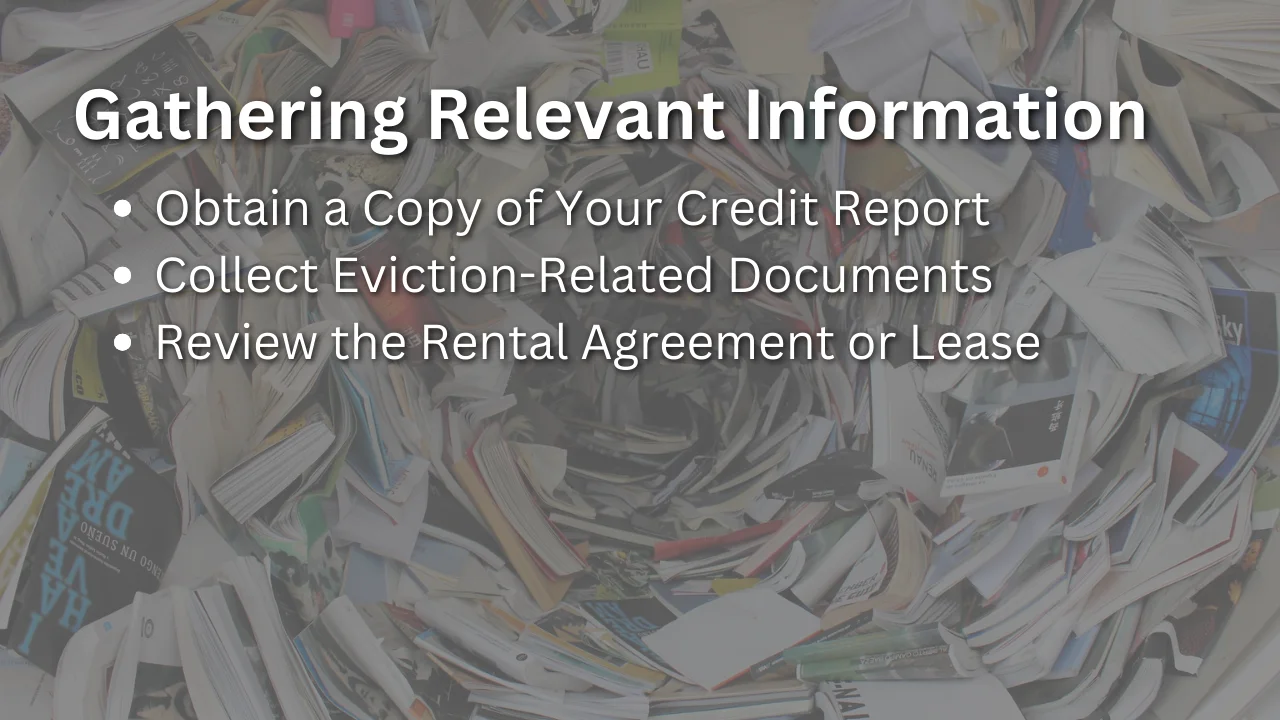
Reviewing the Accuracy of the Eviction
1. Verify dates and details
When reviewing the accuracy of the eviction, verify that the dates and details provided in the eviction report on your credit report align with the actual events. Check for any inconsistencies or errors that may have been recorded incorrectly. It is important to have accurate information to present during the dispute process.
2. Confirm proper legal procedures followed
Ensure that the eviction followed the proper legal procedures according to your local laws and regulations. Check if your landlord or property management followed the necessary steps, such as providing sufficient notice and following the correct eviction process. If you find any violations or irregularities, it could strengthen your case during the dispute.
3. Check for any errors or discrepancies
Carefully scrutinize the eviction report for any errors or discrepancies. This could include misspelled names, incorrect check-in or check-out dates, or inaccurate reasons for the eviction. Any errors found should be noted and addressed during the dispute process to increase your chances of having the eviction removed from your credit report.
Understanding Your Rights as a Tenant
1. Familiarize yourself with local tenant laws
Each jurisdiction has its own set of laws and regulations that protect tenant rights. Familiarize yourself with these laws to better understand your rights and legal options during an eviction. By having a solid grasp of the legal framework, you can effectively navigate the dispute process and advocate for yourself.
2. Consult with a legal professional if necessary
If you encounter complex legal issues or have questions regarding your rights as a tenant, it may be beneficial to consult with a legal professional specializing in housing or tenant law. They can provide guidance, review your eviction case, and advise you on the best course of action.
3. Understand the eviction process
Educate yourself about the eviction process in your area. Understand the steps involved, including the notice period, the reasons for eviction, and the rights and responsibilities of both tenants and landlords. Knowing the process will help you identify any potential violations during the dispute and strengthen your case.
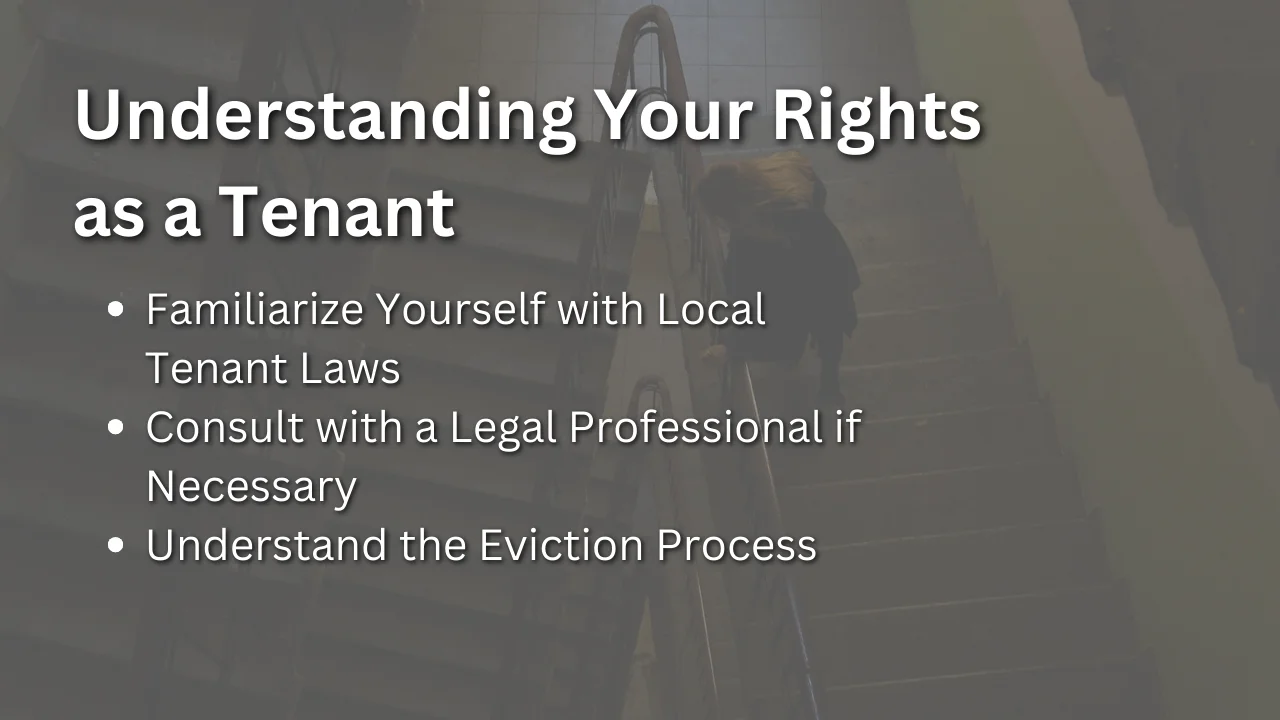
Contacting the Credit Reporting Agencies
1. Identify the credit reporting agencies
Identify the credit reporting agencies that have included the eviction on your credit report. The three major credit reporting agencies are Equifax, Experian, and TransUnion. It is important to contact each agency individually as they may have different procedures for handling disputes.
2. Request a reinvestigation of the eviction
Contact the credit reporting agencies by phone, mail, or through their online portals to request a reinvestigation of the eviction. Clearly state your intention to dispute the eviction and provide them with any relevant information or documents that support your claim. Be prepared to provide your personal information, such as your name, address, and Social Security number.
3. Provide necessary documentation
Along with your dispute letter or during the reinvestigation process, provide any documentation that strengthens your case. This may include rental agreements, court records, correspondence with your landlord, or any other evidence that proves the eviction was reported inaccurately. Cooperate fully with the credit reporting agencies and promptly provide any additional information they may require.
Filing a Dispute with the Credit Reporting Agencies
1. Submit a written dispute letter
Prepare a written dispute letter addressing the credit reporting agencies individually. Clearly state your name, address, and Social Security number on the letter. Explain the reasons for disputing the eviction and provide a detailed explanation of why you believe it is inaccurate or should be removed from your credit report. Be concise yet thorough in your letter.
2. Include relevant evidence and supporting documentation
Attach any relevant evidence or supporting documentation to your dispute letter. This may include copies of eviction notices, court records, or correspondence with your landlord. These documents will strengthen your case and provide credibility to your dispute. Make sure to keep copies of all the documentation and mail the letter via certified mail to ensure proof of delivery.
3. Keep copies of all communication
Throughout the dispute process, it is crucial to keep copies of all communication, including dispute letters, responses from the credit reporting agencies, and any additional documentation exchanged. This documentation will serve as evidence of your efforts to dispute the eviction accurately and will be essential if further action needs to be taken.
4. Follow up regularly
After filing the dispute, maintain regular communication with the credit reporting agencies. Follow up to ensure that your dispute is being processed and ask for updates on the status of your case. Persistence and consistent communication can help expedite the resolution of your dispute.
Working with a Credit Repair Company
1. Evaluate credit repair services
If you require assistance in disputing the eviction on your credit report, you may consider working with a reputable credit repair company. Before engaging their services, thoroughly research and evaluate different credit repair companies. Look for companies with a track record of success in handling eviction disputes and positive customer reviews.
2. Understand the associated costs
Credit repair services typically come with fees, so it is essential to understand the costs associated with working with a credit repair company. Research and compare different companies to determine the prices they charge for their services. Ensure that you have a clear understanding of the fees before proceeding.
3. Review customer reviews and ratings
Before finalizing your decision to work with a credit repair company, read customer reviews and ratings. Feedback from previous clients will provide insights into the company’s reputation, reliability, and success rate. Choose a credit repair company that has a proven track record of assisting clients in disputing evictions on credit reports.
Monitoring Your Credit Report
1. Check your credit report regularly
Even after successfully disputing an eviction and having it removed from your credit report, it is crucial to continue monitoring your credit report regularly. Check for any new inaccuracies or errors that may arise. By staying vigilant, you can promptly address any issues that may impact your credit score in the future.
2. Request updates after a successful dispute
Following a successful dispute, request updated copies of your credit report from all three major credit reporting agencies. Ensure that the eviction has been removed and that your credit report accurately reflects your current situation. This step will provide you with peace of mind and confirmation that your efforts to dispute the eviction were successful.
3. Address any remaining inaccuracies promptly
If you discover any remaining inaccuracies or errors on your credit report, address them promptly. Follow similar steps to the dispute process, gathering relevant information, reviewing the accuracy of the information, and contacting the credit reporting agencies. By staying proactive, you can maintain a healthy credit history and protect your financial well-being.
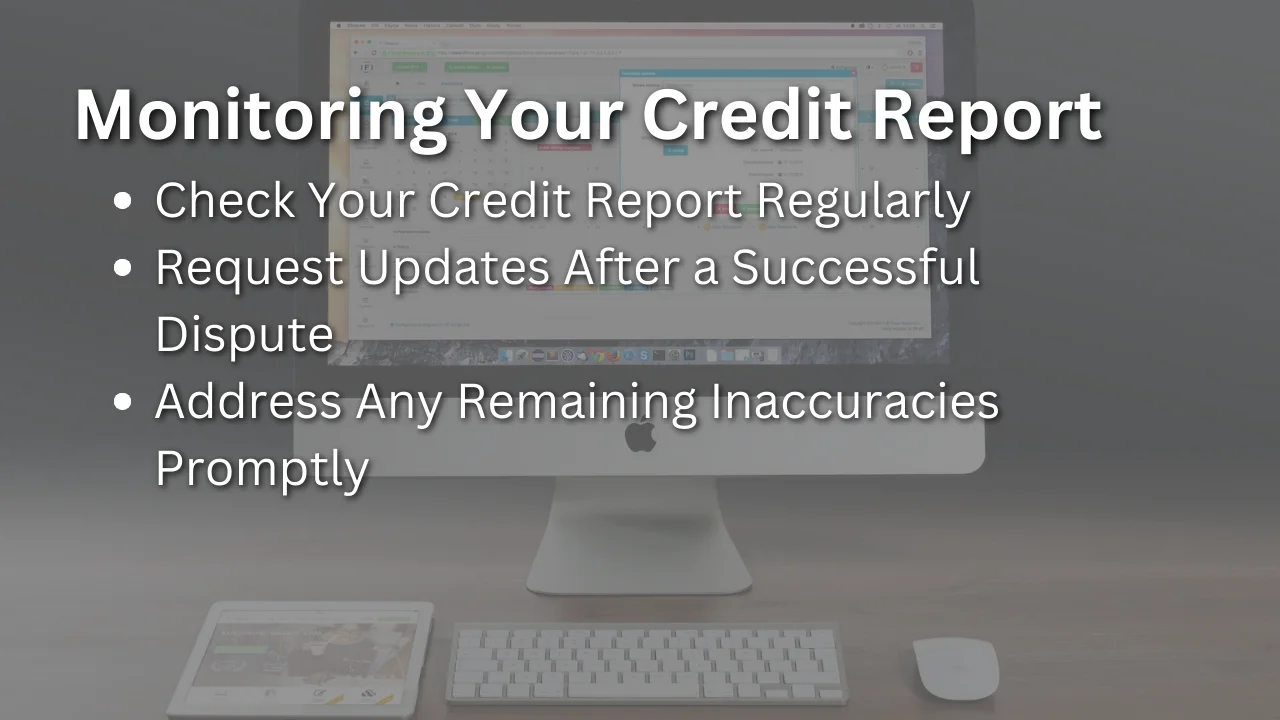
Seeking Legal Assistance
1. Consult with an attorney
If you have encountered significant legal issues throughout the eviction process or if you believe your rights as a tenant have been violated, it is advisable to consult with an attorney. They will provide legal guidance, assess the strength of your case, and advise you on the best course of action.
2. Understand your legal options
An attorney specializing in housing or tenant law can help you understand your legal options. They will explain the different avenues available to you, such as negotiating with your landlord, filing a counterclaim, or pursuing legal action against the credit reporting agencies or landlord. Understanding your legal options is crucial for making informed decisions.
3. Consider legal action if necessary
In cases where your rights have been violated, you may need to consider taking legal action. This could involve suing the landlord for improper eviction practices or pursuing a lawsuit against the credit reporting agencies for inaccurately reporting the eviction. Consult with your attorney to determine the viability and potential outcomes of legal action.
By understanding the impact of evictions on credit reports and following the appropriate steps to dispute an eviction, you can protect your credit score and financial future. Remember to gather all relevant information, review the accuracy of the eviction, know your tenant rights, and communicate effectively with the credit reporting agencies. Whether you choose to navigate the dispute process independently or seek legal assistance, taking proactive measures can help you successfully dispute an eviction on your credit report and safeguard your financial well-being.
Credit Report Attorney for Disputing Credit Report Errors
If you have disputed errors on your credit report but they still show up on your credit report, it may be time to hire a credit report attorney. An attorney can help pressure the credit reporting agencies to get the errors corrected. Credit reports are an important factor for many financial decisions such as applying for a loan.
Did Disputing Your Credit Report Not Work? Call Us Today for a Free Consultation!









